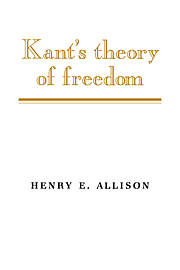Book contents
- Frontmatter
- Contents
- Acknowledgments
- Note on sources and key to abbreviations and translations
- Introduction
- Part I Freedom and rational agency in the Critique of Pure Reason
- Part II Moral agency and moral psychology
- 5 Rational agency and autonomy
- 6 Duty, inclination, and respect
- 7 Wille, Willkür, and Gesinnung
- 8 Radical evil
- 9 Virtue and holiness
- 10 The classical objections
- Part III The justification of morality and freedom
- Notes
- Bibliography
- Index
7 - Wille, Willkür, and Gesinnung
Published online by Cambridge University Press: 05 June 2012
- Frontmatter
- Contents
- Acknowledgments
- Note on sources and key to abbreviations and translations
- Introduction
- Part I Freedom and rational agency in the Critique of Pure Reason
- Part II Moral agency and moral psychology
- 5 Rational agency and autonomy
- 6 Duty, inclination, and respect
- 7 Wille, Willkür, and Gesinnung
- 8 Radical evil
- 9 Virtue and holiness
- 10 The classical objections
- Part III The justification of morality and freedom
- Notes
- Bibliography
- Index
Summary
In the preceding two chapters we were concerned respectively with the change in Kant's conception of agency brought about by the introduction of the concept of autonomy and with the basic elements of his moral psychology as these are presented in the Groundwork and the Critique of Practical Reason. If we were to stop here, however, we would be left with a very incomplete view of Kant's conception of moral agency and, therefore, of his theory of freedom. In order to complete the picture, it is necessary to focus on elements of his theory that, although implicit in these earlier writings, are fully developed only in the major writings of the 1790s, namely, Religion within the Limits of Reason Alone and the Metaphysic of Morals.
The most important of these elements are the distinction between Wille and Willkür and the conception of Gesinnung. The former constitutes a much needed qualification, although not an abandonment, of the Groundwork's account of will as practical reason; whereas the latter, which refers to the underlying disposition or character of a free agent, provides the basis for a further clarification of the conception of a good (and, indeed, an evil) will. We shall also see that it leads to a significant modification of the first Critique's conception of an intelligible character. These, then, are the concerns of the present chapter, which, accordingly, is divided into two parts.
- Type
- Chapter
- Information
- Kant's Theory of Freedom , pp. 129 - 145Publisher: Cambridge University PressPrint publication year: 1990
- 2
- Cited by



